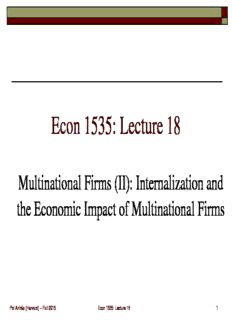
Econ 1535: Lecture 18 PDF
Preview Econ 1535: Lecture 18
Econ 1535: Lecture 18 Multinational Firms (II): Internalization and the Economic Impact of Multinational Firms Pol Antràs (Harvard) – Fall 2015 Econ 1535: Lecture 18 1 Plan for Today Study the internalization decision of MNEs Study effects that MNEs may have on source countries and especially on host countries Effects on labor markets Effects on capital markets (very brief) Productivity spillovers Pol Antràs (Harvard) – Fall 2015 Econ 1535: Lecture 18 2 Internalization Econ 1535: Lecture 18 3 MNEs and Globalization of Production Recent spectacular increase in the way firms organize production on a global scale: “slicing of the value chain”, “international outsourcing”, “fragmentation”, “vertical specialization”, “global production sharing” It is clear that MNEs have played a key role in the disintegration of the production process But an important share of fragmentation occurs outside MNE’s firm boundaries Examples: Apple, Boeing, Nike,… Pol Antràs (Harvard) – Fall 2015 Econ 1535: Lecture 18 4 Internalization In developing their global sourcing strategies, firms not only decide on where to locate the different stages of the value chain, but also on the extent of control to exert over them The issue of internalization or control is crucial for the existence of MNEs But theories of location shed little light on the issue of internalization why will fragmentation occur within firm boundaries? Pol Antràs (Harvard) – Fall 2015 Econ 1535: Lecture 18 5 Theories of Internalization Costly technology transfer: transfer of knowledge 1. or technology may be easier within a single organization than through a market transaction (e.g., licensing) Patent or property rights may be weak or non- existent Knowledge may not be easily packaged and sold Non-excludability Helps explain decision of Intel to own all its plants Pol Antràs (Harvard) – Fall 2015 Econ 1535: Lecture 18 6 Theories of Internalization Vertical integration: consolidation of different 2. stages of a production process Intrafirm purchases may avoid or attenuate contractual difficulties Integration may affect the relative bargaining power and incentives of producers and suppliers in a profit-enhancing way May explain why Toyota internalizes certain upstream production stages, while Nike doesn’t Pol Antràs (Harvard) – Fall 2015 Econ 1535: Lecture 18 7 Empirical Evidence Tests of the internalization decision are harder to come by due to data limitations Some authors have used data on licensing arrangements to test the costly transfer theory Others have used intrafirm trade data to test contractual theories of vertical integration The latter is easily accessible (at least for the U.S.) and offers a broad picture of internalization patterns As exemplified by the following few graphs Pol Antràs (Harvard) – Fall 2015 Econ 1535: Lecture 18 8 Variation in Intrafirm Trade Pol Antràs (Harvard) – Fall 2015 Econ 1535: Lecture 18 9 Variation in Intrafirm Trade Pol Antràs (Harvard) – Fall 2015 Econ 1535: Lecture 18 10
Description: